3 Things To Consider When Buying a Tank Water Heater
May 26, 2022
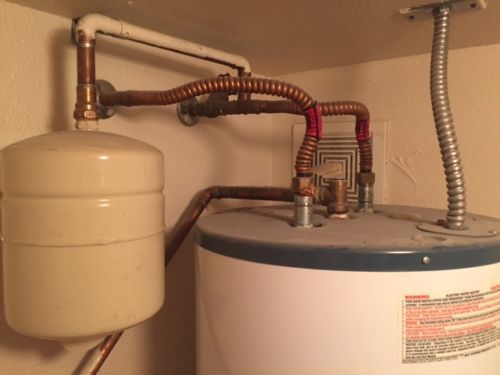
What should you consider when buying a tank water heater?
Updated September 2022
If you’re looking into purchasing a new tank water heater, the first thing you’re probably going to think about is the cost. On average, a new tank water heater costs $2,200, but several factors impact the installation cost and its monthly operation cost.
Before you buy a new water heater, you should consider its:
- Fuel type
- Size
- Efficiency
We’ll walk you through each of these factors to help you determine which type of water heater is best for your Phoenix home.
Do you need hot water fast?
Call Patrick Riley at (602) 280-1793 for a same-day water heater installation. Our polite, professional plumbers will install a water heater that best fits your budget and needs. Schedule with us for a free quote today!
Fuel Type
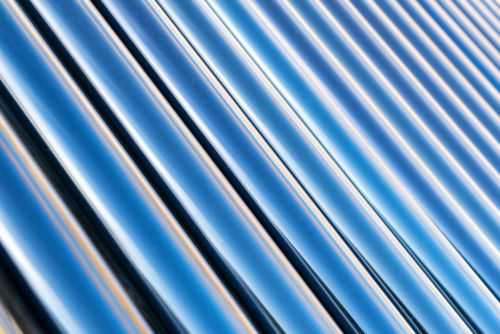
Is a solar-powered water heater right for your home?
There are three types of water heaters: gas, electric, and solar-powered.
If you are replacing an existing water heater, it’s probably most cost-effective to use the same type you had previously since installing a replacement won’t require any new plumbing lines or space.
However, if you’re purchasing a water heater in a new home, there are several things to consider when selecting a fuel type.
If you have access to natural gas or propane, gas water heaters may be a good option for your Phoenix home. Gas water heaters generally cost more to install than electric but less than solar. They cost less to operate each month than electric water heaters since gas is typically less expensive than electricity.
Some other things to know about gas water heaters are:
- They heat water quickly. A gas water heater heats water in about half the time it would take an electric water heater.
- They’re difficult to install. Because gas water heaters require vents to prevent gas from seeping into your home, they are more complicated (and more expensive) to install.
- They work if the power goes out. Since gas water heaters don’t rely on electricity to run, they work even in emergencies.
Electric water heaters are a good option for homeowners that don’t want to pay a hefty upfront price. They’re the cheapest type of water heater to install, but they cost the most to operate.
Electric water heaters also:
- Take a while to heat up. Their recovery time (time to heat up water) is longer than gas water heaters.
- Don’t work without electricity. If you live in an area with frequent power outages, then an electric water heater might not be a great choice.
- Last 10–15 years. The lifespan of electric water heaters is similar to gas.
Solar water heaters are the least common water heater type because they are expensive to install. Homeowners who install a solar water heater will have a high upfront cost but lower operational costs than other fuel types, especially in a sunny area like Phoenix. Additionally, they typically last longer than gas or electric water heaters.
Summary: Electric water heaters are cheap to install but expensive to operate. Gas water heaters cost more to install but less to operate. Solar water heaters are expensive to install but cheap to operate.
Size
When deciding what size water heater to purchase, consider two main factors: how much room you have and how much water you need.
Tank water heaters are what they sound like—water heaters with a big tank that stores the hot water, meaning they can take up a significant amount of space in your home. If you live in an apartment or have limited square footage, you may want to choose a small tank water heater or consider a tankless water heater.
Choosing a small tank water heater might seem like an excellent way to save square footage, but the size of the tank determines the amount of hot water your water heater can hold. If you buy a water heater that’s too small just to save space, you will constantly run out of hot water.
How do you determine what size water heater you actually need? Most households require water heaters in the 40–50 gallon range, but the size that’s right for you really depends on the habits of your household. Sizing tank water heaters can be difficult, so we’ve dedicated a whole blog to the topic to help you figure it out!
Efficiency
The last factor to consider when buying a tank water heater is efficiency. Generally, the more efficient a water heater is, the less it will cost to operate, but the more it will cost to install.
How do you know how efficient the water heater will be? Its Uniform Energy Factor (UEF) will determine its overall efficiency. If you want a solar water heater, look at its Solar Uniform Energy Factor (SUEF). These ratings look at the amount of hot water the system can deliver in an hour, the exact capacity of the system, and the estimated cost to operate the water heater.
The higher the UEF or SUEF rating, the more efficient the water heater. However, while efficiency is important to note when selecting a system, a water heater should not be selected only on its UEF or SUEF rating since many other factors also impact costs.
You can check a system’s UEF or SUEF rating by looking at its specs:
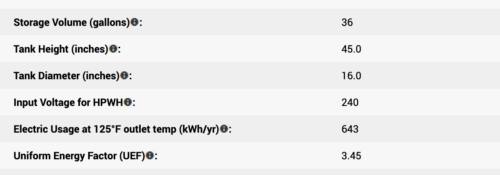
Look at the Uniform Energy Factor for an electric tank water heater / Source: Energy Star
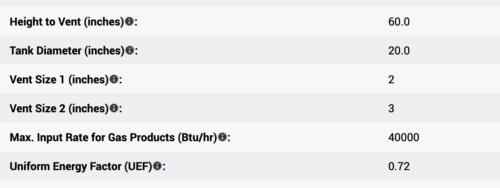
Look at the Uniform Energy Factor for a gas tank water heater / Source: Energy Star

Look at the Solar Uniform Energy Factor for a solar tank water heater / Source: Energy Star
When You Need Expert Advice, Look No Further Than Patrick Riley
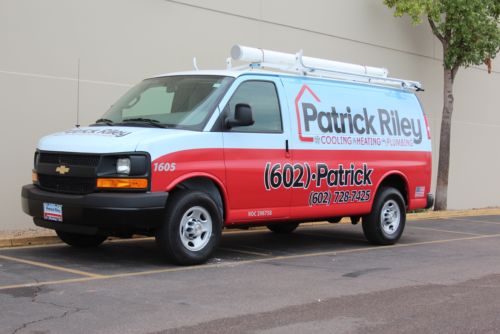
Contact Patrick Riley for an expert tank water heater installation.
If you need help choosing a water heater, contact Patrick Riley at (602) 280-1793 or schedule below. We'll give you honest, expert advice on the best tank water heater systems for you—with no surprise fees or hidden agendas.
Our trustworthy plumbers work hard to find the best solution for you. We have hundreds of 5-star customer reviews backing up our work. And to provide peace of mind, we'll redo the job for free if you're not completely satisfied!
Get 10% off (Up to $150)

Ty Lindsay is the Director of Field Operations at Patrick Riley | Isley’s and a 15-year veteran of the plumbing and HVAC trades. In 2010, Ty earned his Journeyman’s plumbing license. He became a Master Plumber five years later and earned his Journeyman HVAC technician’s license that same year. Ty’s breadth of knowledge in plumbing and HVAC includes both residential and commercial work. He’s been a loyal member of the Patrick Riley | Isley’s team since 2016.
- Posted in:
- Buyer's Guide
